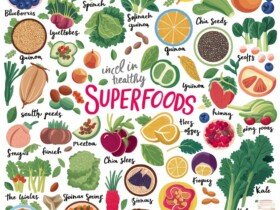Introduction: The Importance of a nutritious breakfast foods
Breakfast is often heralded as the most important meal of the day, and for good reason. Starting your day with a nutritious breakfast can set the tone for the rest of your day, influencing both your physical and mental well-being. When you consume a meal rich in essential nutrients in the morning, you provide your body with the necessary fuel to perform optimally. Improved concentration, better mood, and enhanced overall health are just a few of the benefits associated with a well-balanced breakfast. Skipping this crucial meal can lead to decreased energy levels, poor cognitive function, and an increased likelihood of unhealthy eating habits later in the day.
One of the primary reasons why breakfast is so vital is its impact on cognitive function. Studies have shown that individuals who eat a nutritious breakfast tend to have better memory, attention, and problem-solving skills. This is particularly important for students and professionals who need to be at their mental best throughout the day. Additionally, a healthy breakfast can stabilize blood sugar levels, preventing the spikes and crashes that often result in irritability and fatigue.
Moreover, a balanced breakfast can contribute to long-term health benefits. Consuming a variety of nutrient-dense foods in the morning can help to maintain a healthy weight, reduce the risk of chronic diseases such as diabetes and heart disease, and promote overall well-being. By kick-starting your metabolism in the morning, you enable your body to efficiently process and utilize the nutrients consumed throughout the day.
The goal of this blog post is to provide readers with a curated list of the top 10 nutritious breakfast foods that can be easily purchased. These foods have been selected based on their nutrient profiles, ease of preparation, and overall health benefits. By incorporating these items into your morning routine, you can ensure a strong, healthy start to your day.
1. Greek Yogurt
Greek yogurt stands out as one of the most nutritious breakfast foods you can buy, thanks to its impressive nutrient profile and versatility. Rich in protein, Greek yogurt provides a substantial amount of this essential macronutrient, which plays a crucial role in muscle repair and growth. With approximately 10 grams of protein per serving, it helps to keep you feeling full and energized throughout the morning, reducing the temptation to snack before lunch.
In addition to its high protein content, Greek yogurt is also a good source of probiotics. These beneficial bacteria are vital for maintaining a healthy gut microbiome, which can enhance digestion and support immune function. Regular consumption of probiotics has been linked to numerous health benefits, including improved mental health, weight management, and a reduced risk of certain diseases.
One of the most appealing aspects of Greek yogurt is its versatility. It can be easily paired with a variety of toppings to create a delicious and satisfying breakfast. Adding fresh fruits like berries or bananas can boost your intake of vitamins, minerals, and antioxidants. Nuts and seeds, such as almonds or chia seeds, add healthy fats and additional protein, making your meal even more nutritious. A drizzle of honey can provide a natural sweetness without the need for refined sugars.
Moreover, Greek yogurt can be incorporated into various recipes, from smoothies to parfaits, making it an excellent choice for those seeking a quick and healthy breakfast option. Its thick and creamy texture also makes it a perfect substitute for sour cream or mayonnaise in savory dishes, adding to its appeal as a versatile ingredient.
Overall, Greek yogurt is a powerhouse of nutrients that can help you start your day on the right foot. Its combination of high protein, probiotics, and versatility makes it a top choice for a nutritious breakfast that supports overall health and well-being.
2. Oatmeal
Oatmeal is a highly nutritious breakfast food that provides numerous health benefits, making it an excellent choice to start your day. One of the key advantages of oatmeal is its high fiber content, particularly beta-glucan, a type of soluble fiber. Beta-glucan is known for its ability to lower cholesterol levels, thus promoting heart health. Additionally, the fiber in oatmeal aids in digestion, helps regulate blood sugar levels, and provides a feeling of fullness that can aid in weight management.
Oatmeal is also a great source of long-lasting energy. The complex carbohydrates in oats are digested slowly, which means they provide a gradual release of energy, helping you stay energized and alert throughout the morning. This makes oatmeal an ideal choice for those who need sustained energy, whether for work, school, or physical activities.
There are several types of oatmeal available, each with its own unique characteristics. Steel-cut oats are the least processed type, offering a chewy texture and a slightly nutty flavor. Rolled oats, also known as old-fashioned oats, are steamed and then rolled flat, making them quicker to cook while still retaining much of their nutritional value. Instant oats are the most processed variety, designed for quick and easy preparation, but they may contain added sugars and flavorings, so it’s important to check the labels when purchasing.
To enhance the nutritional profile of your oatmeal, consider adding healthy toppings. Fresh berries are an excellent choice, providing antioxidants and vitamins. Nuts such as almonds or walnuts add a satisfying crunch and healthy fats. Seeds like chia or flaxseeds are rich in omega-3 fatty acids and additional fiber. By incorporating these toppings, you can create a delicious and well-rounded breakfast that supports overall health and well-being.
3. Eggs
Eggs are a powerhouse of nutrition, making them an excellent choice for a healthy breakfast. They are packed with high-quality protein, which is essential for muscle repair and growth. Each egg contains approximately six grams of protein, providing a substantial portion of the daily recommended intake. In addition to protein, eggs are rich in essential vitamins and minerals. They offer significant amounts of Vitamin B12, which is vital for maintaining nerve function and the production of red blood cells, and Vitamin D, which supports bone health and immune function.
Beyond vitamins, eggs are also a good source of minerals such as phosphorus, selenium, and iron. Phosphorus is crucial for healthy bones and teeth, selenium functions as an antioxidant, and iron is necessary for oxygen transport in the blood. These nutrients collectively contribute to overall health and well-being, making eggs a highly nutritious food.
One of the greatest advantages of eggs is their versatility in breakfast dishes. Whether you prefer scrambled eggs, omelets, or boiled eggs, there are numerous ways to incorporate them into your morning routine. Scrambled eggs can be quickly prepared and seasoned to taste, while omelets offer an opportunity to include a variety of fillings such as cheese, ham, and an assortment of vegetables. Boiled eggs are convenient for a grab-and-go option, and they can be easily paired with whole-grain toast or fresh fruits for a balanced meal.
To further boost the nutritional value of your breakfast, consider pairing eggs with vegetables. Adding spinach, tomatoes, bell peppers, or mushrooms to your scrambled eggs or omelets not only enhances the flavor but also increases the fiber and antioxidant content of your meal. This combination ensures a more satisfying and nutrient-dense breakfast, providing the energy and nutrients needed to start your day on the right foot.
Avocado
Avocados are not only a delicious addition to any breakfast but also a powerhouse of nutrition. These versatile fruits are rich in healthy fats, particularly monounsaturated fats, which are known to support heart health by reducing bad cholesterol levels. Additionally, avocados are packed with dietary fiber, which aids in digestion and helps keep you feeling full and satisfied throughout the morning.
One of the standout features of avocados is their impressive vitamin content. They are a good source of vitamins C, E, K, and several B vitamins, including folate. These vitamins play crucial roles in maintaining overall health, from supporting the immune system to promoting healthy skin and hair. The presence of potassium in avocados also contributes to their status as a heart-healthy food by helping to regulate blood pressure levels.
Incorporating avocados into your breakfast can be both simple and delicious. One popular way to enjoy avocados is by making avocado toast. Simply spread mashed avocado on whole-grain toast, and you can add toppings like a poached egg, cherry tomatoes, or a sprinkle of seeds for extra flavor and nutrition. Another easy option is to blend avocados into a smoothie; they provide a creamy texture and pair well with ingredients like spinach, banana, and almond milk.
Avocados also make a great addition to egg dishes. Whether you prefer scrambled eggs, an omelet, or a breakfast burrito, adding sliced or diced avocado can enhance the taste and increase the nutritional value of your meal. Their creamy texture and mild flavor complement a variety of ingredients, making them a versatile choice for breakfast. By including avocados in your morning routine, you can enjoy a satisfying and nutrient-dense start to your day.
Whole Grain Bread
When selecting bread for a nutritious breakfast, whole grain bread stands out as a superior choice over its refined counterparts. Whole grain bread retains all parts of the grain, including the bran, germ, and endosperm, which are often removed in refined grains. This preservation results in a product rich in dietary fiber, vitamins, and essential minerals.
Dietary fiber, a key component of whole grain bread, plays a crucial role in maintaining digestive health. It aids in preventing constipation and can help regulate blood sugar levels, making it an excellent choice for those monitoring their glucose. Additionally, the higher fiber content contributes to a feeling of fullness, which can help in managing weight by reducing the likelihood of overeating.
In terms of vitamins, whole grain bread is a valuable source of B vitamins, including thiamin, riboflavin, niacin, and folate. These vitamins are essential for energy production, brain function, and the formation of red blood cells. Minerals such as iron, magnesium, and selenium are also abundant in whole grain bread, supporting various bodily functions including immune support, muscle function, and antioxidant defense.
To maximize the nutritional benefits of whole grain bread, consider pairing it with other wholesome toppings. Nut butter, such as almond or peanut butter, provides healthy fats and protein, creating a balanced and satisfying breakfast. Avocado is another excellent topping, offering heart-healthy monounsaturated fats, fiber, and a host of vitamins and minerals. For those seeking additional protein, lean options such as turkey slices or a poached egg can be added to whole grain bread, contributing to muscle repair and sustained energy levels throughout the morning.
Incorporating whole grain bread into your breakfast routine is a simple yet effective way to enhance your nutritional intake. Its combination of fiber, vitamins, and minerals supports overall health, while versatile topping options allow for a varied and enjoyable meal.
Berries
Berries are a quintessential addition to any nutritious breakfast, offering a wealth of health benefits packed into small, flavorful morsels. These vibrant fruits are renowned for their high antioxidant content, which plays a crucial role in protecting the body from oxidative stress and inflammation. Among the array of antioxidants found in berries, anthocyanins are particularly noteworthy, contributing to both their vivid colors and their protective properties.
In addition to antioxidants, berries are rich in essential vitamins and dietary fiber. For instance, strawberries and raspberries are excellent sources of vitamin C, which is vital for immune function and skin health. Blueberries boast high levels of vitamin K, important for bone health, while blackberries provide a good dose of vitamin E, known for its role in skin and eye health. The fiber content in berries also supports digestive health and helps maintain a feeling of fullness, which can be beneficial for weight management.
The variety of berries available allows for endless culinary creativity. Strawberries, with their sweet and slightly tart flavor, are a delightful addition to yogurt or cereal. Blueberries, known for their mild sweetness, blend seamlessly into oatmeal or can be enjoyed on their own. Raspberries and blackberries, with their unique textures and flavors, can elevate a smoothie or be sprinkled over a bowl of cottage cheese.
Incorporating berries into your breakfast routine is both simple and versatile. Whether fresh, frozen, or dried, they can be mixed into a smoothie, layered in a parfait, or enjoyed as a topping on whole grain toast with a smear of nut butter. Their natural sweetness and nutritional benefits make them a perfect choice for starting the day on a healthy note.
Nuts and Seeds
Nuts and seeds are nutritional powerhouses that can significantly enhance the quality of your breakfast. They are rich in healthy fats, proteins, and a variety of essential micronutrients, making them an excellent choice for a balanced and nutritious start to your day.
Among the popular options, almonds stand out due to their high vitamin E content, which acts as an antioxidant, protecting your cells from oxidative damage. Walnuts, on the other hand, are renowned for their high omega-3 fatty acid content, which supports heart health and cognitive function. Chia seeds are another excellent choice, packed with fiber, omega-3s, and protein, which help keep you full and energized throughout the morning. Flaxseeds, known for their high lignan content, offer both antioxidant properties and a good dose of fiber.
Incorporating nuts and seeds into your breakfast is both easy and versatile. For a simple yet nutritious option, consider adding a handful of almonds or walnuts to your morning yogurt or smoothie. This not only boosts the protein content but also adds a satisfying crunch. Chia seeds can be mixed into oatmeal or overnight oats, absorbing liquid to form a gel-like consistency that enhances the texture and nutritional profile of your meal. Flaxseeds, whether ground or whole, can be sprinkled over cereals, blended into smoothies, or even mixed into pancake batter for an added fiber and nutrient boost.
Moreover, nuts and seeds can be used as a topping for whole grain toast. Spread a layer of nut butter, such as almond or peanut butter, on your toast and sprinkle with chia or flaxseeds for an extra layer of flavor and nutrition. This combination not only provides a dose of healthy fats and protein but also keeps you satiated until your next meal.
By integrating nuts and seeds into your breakfast routine, you can enhance your nutrient intake and enjoy a variety of textures and flavors, all while supporting your overall health and well-being.
8. Smoothies
Starting your day with a nutritious smoothie can be an excellent way to ensure you receive a balanced intake of essential nutrients. Smoothies are incredibly flexible and can be tailored to include a variety of fruits, vegetables, protein sources, and healthy fats, making them an ideal breakfast option for those with busy lifestyles or specific dietary needs.
One of the primary benefits of smoothies is their ability to pack a significant amount of vitamins and minerals into a single, convenient meal. By incorporating a diverse range of fruits and vegetables, you can easily meet your daily recommended intake of vitamins A, C, and K, as well as essential minerals like potassium and magnesium. Additionally, the fiber content from these ingredients can promote digestive health and help maintain steady blood sugar levels throughout the day.
To create a balanced and nutrient-dense smoothie, it’s important to include a source of protein. Options such as Greek yogurt, protein powder, or silken tofu can add a creamy texture while also promoting muscle repair and growth. Healthy fats are another essential component; ingredients like avocado, flaxseeds, or chia seeds not only enhance the nutritional profile of your smoothie but also aid in the absorption of fat-soluble vitamins.
For those who prefer a sweeter taste, adding natural sweeteners like honey, maple syrup, or a ripe banana can enhance flavor without the need for refined sugars. Additionally, incorporating a liquid base such as almond milk, coconut water, or even green tea can contribute to hydration and further boost the nutritional value of your smoothie.
Experimenting with different combinations of ingredients can keep your smoothies exciting and prevent monotony. Whether you’re aiming for a tropical blend with mango and pineapple or a green powerhouse with spinach and kale, the possibilities are virtually endless. By prioritizing a mix of carbohydrates, proteins, and healthy fats, you can create delicious and satisfying smoothies that support your overall health and well-being.
Conclusion: Making Nutritious Choices for a Healthy Start
In summary, selecting nutrient-dense breakfast foods is an essential strategy for starting the day on a healthy note. From whole grains like oatmeal and whole wheat bread to protein-packed eggs and Greek yogurt, the top 10 nutritious breakfast foods we’ve discussed provide a variety of vitamins, minerals, and other vital nutrients. These options not only help sustain energy levels but also support overall health and wellness.
Incorporating a range of fruits, such as berries and avocados, offers antioxidants and healthy fats, while nuts and seeds contribute to heart health and can be easily added to many breakfast dishes. The inclusion of vegetables, like spinach, in your morning meal can further enhance nutritional intake, providing fiber and essential vitamins. Additionally, choosing beverages like green tea or smoothies can complement your breakfast, adding hydration and extra nutrients.
It’s important to recognize that everyone has unique tastes and nutritional needs. Therefore, experimenting with different combinations of these nutritious breakfast foods can help you find what works best for you. Whether you enjoy a sweet or savory start to your day, the diversity of options allows for creativity and personalization in meal planning.
By prioritizing these nutrient-dense foods, you set a solid foundation for the rest of your day, promoting sustained energy, improved focus, and overall well-being. Make a conscious effort to integrate these healthy choices into your daily routine, and experience the positive impact on your life.
























